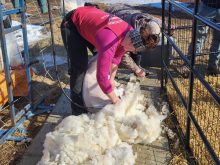It is unclear whether cattle trade between Canada and the United States will start on schedule now that two legal complaints have been filed against the U.S. Department of Agriculture.
The Ranchers Cattlemen’s Action Legal Fund, or R-CALF, filed its 36-page complaint in U.S. district court in Billings, Montana, Jan. 10. It requested an injunction against the final rule that would allow the importation of Canadian cattle and “all edible bovine meat products derived from cattle of Canadian origin” on March 7.
The brief said Canadian cattle could bring BSE to the U.S. and expose consumers there to increased risk of contracting a fatal disease associated with eating BSE-tainted meat. The complaint also cited severe economic hardship to American producers if trade resumes.
Read Also

Charges laid after cattle theft
Saskatchewan RCMP lay two charges against a man after six cattle went missing.
The American Meat Institute, which represents packers and processors, filed a 16-page complaint in Washington, D.C. Dec. 30, demanding that trade open to cattle of all ages rather only young animals. The institute said limiting imports to younger animals would leave American packers at a disadvantage.
It said the U.S. should move forward with its decision to import Canadian cattle and meat products because the safeguards to ensure BSE prevention and food safety are intact.
Canada anticipated the R-CALF action and is seeking intervener status when the case is heard, said Dennis Laycraft, executive vice-president of the Canadian Cattlemen’s Association.
Canada could be a direct intervener or a friend of the court with relevant information on the case, he said.
“We’re looking at intervention status but we haven’t quite cleared up exactly what way we’ll file that information.”
Last year, the Montana-based
R-CALF successfully halted the sale of Canadian bone-in meat to the U.S. and the USDA decided not to challenge the case because of procedural problems it encountered when it tried to expand trade.
Alberta Beef Producers chair Darcy Davis said the USDA has attempted to address every contingency in this rule and should be in a strong legal position to open borders.
“This time USDA will aggressively defend from what we understand,” he said.
The National Cattlemen’s Beef Association is not involved in the legal wrangling.
“We don’t condone frivolous lawsuits,” said president elect Jim McAdams. However, he also said NCBA members are saying trade should not resume until concerns over Canada’s feed ban and the two most recent BSE cases are answered to their satisfaction. A group of American producers are visiting Canada to investigate the situation before the NCBA’s annual meeting in San Antonio Feb. 2-5.
McAdams said his association regretted R-CALF’s earlier injunction stopping bone-in meat because a free flow of a wider range of meat cuts would assuage many consumers’ and producers’ concerns.
“We would have been able to absorb additional cases with less controversy,” he said.
He could not guess whether the border might open March 7 as stated in the USDA rule.
“It is too hard to speculate,” he said.
Steve Kay, publisher of Cattle Buyers’ Weekly, said the government has 60 days to act from the time each suit was filed.
“Nobody quite knows what will happen over the next week or so,” he said.

















